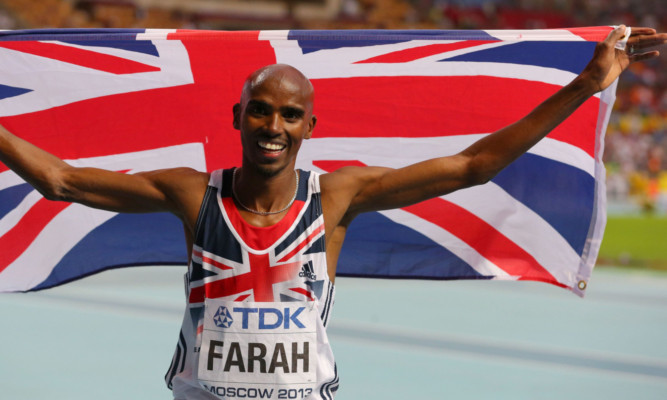Mo Farah crowned a golden week in Moscow by adding the men’s 5000m to the 10,000m title he secured last Saturday.
The 30-year-old Londoner has now matched the feat of the peerless Kenenisa Bekele, the only other athlete to win double gold in the men’s distance events at both the Olympics and world championships.
In another dramatic night at the Luzhniki Stadium, Britain’s Adam Gemili upstaged Usain Bolt, while the queen of women’s sprinting, Allyson Felix, was carried off the track in agony.
Farah is now, arguably, Britain’s greatest-ever athlete.
Having become the first British man to win a world title over 25 laps on the first night in Moscow, Farah last night faced another thriller over half the distance.
At times run at pedestrian pace, it took almost 3000m for an injection of speed by Farah’s Kenyan rivals, who probably realised the Briton was running a tactical race with an eye on a last-lap charge.
Farah eased to the front of the field with three laps remaining and the seven rivals tracking him must have pondered whether the 25 laps in last weekend’s 10,000m had taken its toll.
It hadn’t. Farah held them off with a phenomenal 53.51 second-last lap to go on to victory in 13:26.98.
“The race went well, I was really happy,” he said. “I had a stitch from about eight laps to go and I was kind of pushing my stomach in. So I went to the front to try to control the race and also to stay out of trouble.
“But then the pace slowed down and I tried to forget about it and come through. It was important that I got over the stitch, but I was confident after running a fast 1,500m towards the end of the season, that if it came down it, I would have been able to come home strong. But I had lot of respect for the other guys.”
Farah added: “It’s amazing to have done the double double. There are not many athletes who have done that, only the great Kenenisa Bekele who has achieved so many things.
“To be able to achieve what he has achieved is just an honour.”
Now with five global titles in three years, Farah was presented with his medal by Lord Coe, probably one of the few Britons with a competing claim to be called our greatest-ever athlete.
Usain Bolt started his campaign for his seventh world championship gold medal somewhat unusually by not being the fastest of the 200m qualifiers.
That honour fell to Britain’s teenage sprinter Adam Gemili, whose winning 20.17 in the morning’s sixth heat obliterated his personal best and was the fastest run by a Briton since 2005.
Come last night’s semi-finals, Gemili had the temerity to upstage the great man again, ducking under 20 seconds for the first time and joining John Regis in an elite club of two.
His 19.98 clocking was a spectacular performance and will ensure he receives a good lane draw for today’s final.
The 19-year-old, who joins Usain Bolt in being the only teenagers to break the 20-second barrier, said: “I was in shock going over the line and seeing the time.”
James Ellington, fourth in the second heat in 20.44, and Delano Williams, 20.61 for seventh place in heat one, missed out on the final.
The women’s 200m final had a bittersweet taste about it.
The potential for fireworks was there Jamaica’s Shelly-Ann Fraser Pryce against double-Olympic champion Allyson Felix.
But Felix pulled up with a suspected hamstring tear in the first 50 metres, leaving Fraser-Pryce to take gold in 22.17.
The men’s 4x400m final rounded off Day 7 at the 14th IAAF World Championships.
Last summer’s Olympics witnessed one of the all-time surprises in this event as the Bahamas (population 347,000) defeated the behemoth of 4x400m running, the USA (population 313 million) to win the gold medal.
GB & NI was expected to lead the European challenge, and as expected, Scotland’s Jamie Bowie who ran in the heats was dropped in favour of national champion Nigel Devine.
As it transpired, Britain lay in bronze position with only the anchor leg to come, but finished out of the medals in fourth, in 3:00.88. Gold went to the United States in a world leading 3.58.71, with Jamaica in silver and hosts Russia taking bronze.
